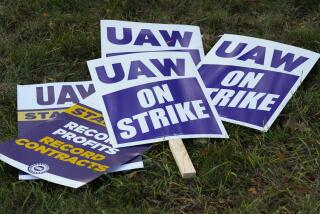Debt Forges Desperation in Russian Steel Town : Economics: Lysva’s factory is insolvent, threatening the community. Nationwide, many face a similar dilemma.
- Share via
LYSVA, Russia — The factory stands idle, smothered by debt. The city is flat broke. And everyone with a garden is out planting potatoes to see them through the coming winter.
Two and a half years after the collapse of the Soviet Union, the grimy old steel town of Lysva (population 94,000) is a requiem for socialism. Capitalism never had a chance to transform this typical company town on the western flank of the Ural Mountains; Russia’s lurch toward a free market killed Lysva from afar.
The Lysva metallurgical factory, which employs one of every eight residents here, has halted its operations because it cannot pay the $780,000 in back wages owed its 12,000 workers. While Moscow officials put the finishing touches on a bankruptcy law, small cities like Lysva across the Russian heartland are becoming ever more desperate.
“A woman came to my office last week and begged me to pay her back wages,” factory President Oleg P. Ananin said. “She said she hadn’t eaten anything but grass in two days.”
Deaths from alcohol poisoning have increased, and so have suicides, officials say.
Workers are not the only ones going unpaid.
The factory is far behind on the city, regional and federal taxes that consume up to 90% of its meager profits. It can’t pay the energy bills that have risen 2,000% in the last three years. It can’t even buy the raw materials needed to keep operating.
The insolvent factory cannot begin to afford its day-care centers, which serve 80% of the city’s preschoolers, or maintain its apartments, in which 70% of all city residents still live.
Nor can the silent plant finance its medical clinics, summer camps, swimming pool, hotel, gym, stadium, skiing center or Palace of Culture--all perquisites that workers came to expect under socialism but that make the factory wildly uncompetitive in Russia’s new market-driven economy.
In short, the factory that was founded in 1785 by Prince Boris G. Shakhovskoi, won the Order of Lenin in 1942 and was privatized as a joint-stock company in 1992 is now bankrupt.
And since the giant smoke-belcher once provided up to 67% of the city’s tax base--as well as most of its social services--the city of Lysva has gone bust too.
The city owes $1.1 million in unpaid wages and utility bills. It has slashed spending drastically, even cutting in half the subsidies for school lunches, but still the deficit is rising, City Administrator Vadim D. Novosyolov said.
Now, the teachers, who have not been paid since March, are threatening to strike.
With its poverty, aging brick buildings and disastrous balance sheet, Lysva is typical of thousands of small Russian cities that were built around one major--now troubled--industry. But unlike unemployed Muscovites, who can often find work in the burgeoning private sector, residents of Lysva have nowhere to turn if their employer fails.
Despite the inevitable suffering and upheavals, the government of President Boris N. Yeltsin now seems determined to allow the weakest of Russia’s enterprises to restructure or die.
Since Russia passed its first bankruptcy law last year, 30 enterprises have registered as bankrupt, and at least 1,200 more are considered insolvent, according to Sergei G. Belyayev, head of the newly created Federal Bankruptcy Agency.
Only in the last several weeks, however, has the government begun issuing concrete instructions on how the bankruptcy law is to be implemented. And it is not yet known which of the sinking factories will be bailed out by the government and which are to be allowed to shut down or be sold.
Officials say the bankruptcy process will give factories such as Lysva’s a structured way to reorganize, settle debts and possibly attract fresh capital. Unless creditors can be assured of payment--at least by a bankruptcy court--no one will invest here, they note.
But it will not be easy to persuade Russians that bankruptcy means anything less than meltdown.
The very word bankruptcy inspires terror in a population that for 70 years was told that socialism was superior to capitalism because it would never allow a factory to go bankrupt and throw workers out into the street.
“They think bankruptcy means the end, that the factory doors will be nailed shut, and no one will ever be let in again,” said Viktor V. Golubev, deputy director of the bankruptcy agency. “We need to explain to our citizens, and to our factory directors . . . that bankruptcy itself does not cause unemployment.”
Lysva officials believe that bankruptcy will only give foreigners and the Russian mafia a chance to buy up their plant at rock-bottom prices.
“A small group of people in this country are now amassing a huge amount of capital,” factory President Ananin said. “Once it becomes profitable to invest here . . . they’ll buy out our plant. I think this is being masterminded.”
As in many small cities, former Communist Party officials still hold most of the powerful positions in Lysva--and creditors are afraid to tangle with them, City Administrator Novosyolov said.
“I don’t see a creditor who would dare to force the city into bankruptcy,” Novosyolov said. “We will use this to our advantage.”
But local officials believe that the factory could be made profitable if only it could get a temporary tax holiday and be relieved of the expense of providing its workers with housing, day care, recreation and medical care.
“Of course, all of this raises our cost of production and lowers our competitiveness,” said Ananin, who had Novosyolov’s city administrator job before he became the factory president. “We still have a mixture of socialism and a market system.”
The plant has been offered a $150-million credit to buy equipment from Germany to manufacture cold-rolled steel. But with annual interest rates at 213% and the strapped Russian government slashing subsidies to industry, Ananin said he cannot raise the $150 million in matching funds he needs to close the German deal--and is not sure he could pay the money back if he borrowed it.
He believes declaring bankruptcy will do nothing to help, because neither the government nor commercial banks will lend the money the plant needs to restructure.
“So what will happen? The plant will close down,” Ananin said. “The people will be thrown out into the street. Who will feed them?”
The Russian labor force today is virtually immobile. Citizens still need permission to move to Moscow and St. Petersburg, and even if an unemployed Lysva worker found a new job somewhere else, moving would mean giving up a heavily subsidized factory apartment and paying steep free-market rent.
The only private enterprises in Lysva are a few kiosks and street vendors who peddle cheap imported clothing, food and liquor. Factory workers lack the capital to start a business, officials say, and high taxes kill off law-abiding entrepreneurs before their ventures can get off the ground.
“Our situation is like the Great Depression of the 1930s,” Ananin said. “There are private businesses in this country, but all they do is buy and sell things. Anyone who tries to produce anything, in industry or in agriculture, has gone bankrupt. In this country, it is not profitable to produce.”
Lysva residents cannot understand why their factory is going under.
During World War II, the plant made Soviet army helmets, but in the 1960s it converted to peacetime production and began churning out kitchen stoves, high-quality enamel pots and pans and other metal products.
“We don’t make tanks or bullets,” Ananin said. “We make consumer products that are in demand all over the country.”
In fact, the metallurgical factory is a mishmash of the obsolete and the up-to-date, the hopeless and the promising.
Until it ground to a halt this spring, the factory was still producing steel ingots in open-hearth furnaces with century-old technology.
The process is so inefficient that the steel coming out of the factory is worth at least 15% less than the raw materials and energy that went into producing it, said Mikhail M. Balan, the company’s new marketing director.
Nearly 2,500 people worked in that department, and their prospects for going back to work are slim. Plant managers are hoping to scrape together the money to reopen parts of the plant soon--but with at least 1,500 fewer workers. The trade union is protesting the layoffs.
“It’s possible that we are just postponing the inevitable, but we don’t see any other way,” union leader Alexander G. Lyamin said. “You may think this is strange, but we still think our government ought to help us.”
More to Read
Sign up for Essential California
The most important California stories and recommendations in your inbox every morning.
You may occasionally receive promotional content from the Los Angeles Times.













